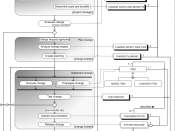�PAGE � �PAGE �3�
Change Management in the Learning Organization
Gregory Wright
OMM 625 Learning Organization & Effectiveness
Brandy Goldston
Monday October 22, 2012
In this paper I intend to discuss change management approaches that support the learning organization philosophy. The learning organization is defined as an organization that acquires knowledge and innovates fast enough to survive and thrive in a rapidly changing environment. Learning organizations (1) create a culture that encourages and supports continuous employee learning, critical thinking, and risk taking with new ideas, (2) allow mistakes, and value employee contributions, (3) learn from experience and experiment, and (4) disseminate the new knowledge throughout the organization for incorporation into day-to-day activities. On the other hand we have a process called change management which is defined as minimizing resistance to organizational change through involvement of key players and stakeholders. At my organization these two go hand in hand and it allows for us as a company to experience constant growth and development of our staff.
Our employees are more willing to welcome change when we train them in the process.
As businesses moves through the 21st century, they are becoming more dependent upon their managers to be change agents. These companies actually seek managers who can bring success to their organizations. Three of the characteristics we look for in our new managers are they must have the ability to stimulate change, excellent planning capabilities, and ethics.
Over the years I have spent in management I have learned that success in becoming a learning organization relies on a commitment to learning on the part of the organizations I have worked for and the willingness of the individuals involved to be receptive to the change process. As a manager, what we usually can change falls into basically three categories; people, structure, or...


